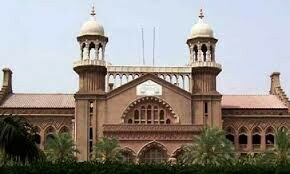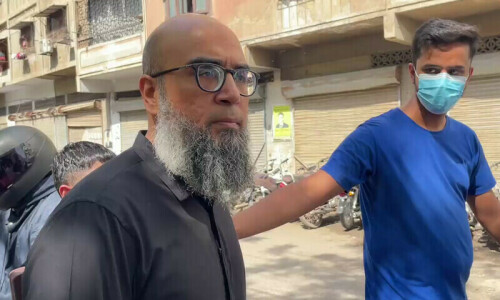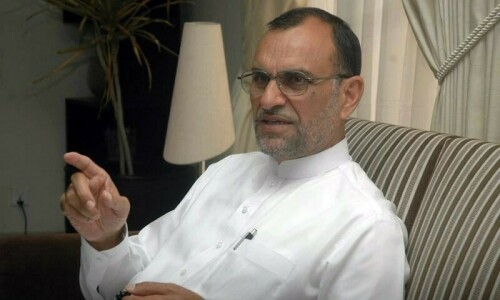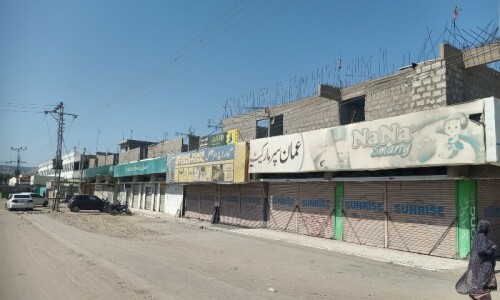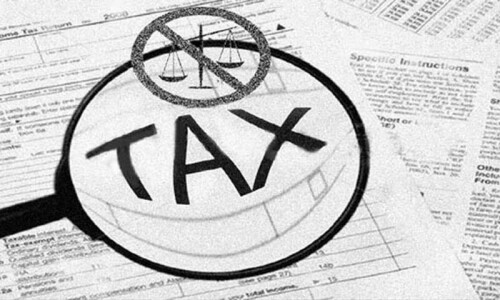ISLAMABAD: Former president retired Gen Pervez Musharraf’s desire to go to Dubai to see his ailing mother was frustrated on Monday when the Supreme Court suspended the June 12 Sindh High Court order till it decides government’s appeal against removing his name from the Exit Control List.
The hearing of the appeal will start after four weeks.
“The impugned (June 12) judgment is suspended,” declared Justice Nasir-ul-Mulk, who is heading the five-judge special bench of the Supreme Court.
The federal government had challenged on June 14 the SHC order on apprehensions that if allowed to leave the country the former dictator may not come back to stand a treason trial under Article 6 of the Constitution. It had also requested the apex court to issue an order to restrain the retired general from going abroad without the court’s permission.
Reacting swiftly to the interim order, Mr Musharraf’s counsel Advocate Chaudhry Faisal Hussain, who was assisting Barrister Dr Farogh Naseem, said the court deemed it appropriate to determine the application of ‘Doctrine of Merger’ and granted leave to appeal by suspending the high court order.
“It is a normal way of the Supreme Court,” he said, adding that his client also wanted resolution of the longstanding controversy because the government was using it for political gains and it intended to use the court to settle political scores.
He, however, expressed the confidence that the court would decide the issue purely on legal plane without allowing the government to use it to gain political mileage.
Related: SHC allows Musharraf to go abroad
Attorney General Salman Aslam Butt argued before the Supreme Court that the government was strictly following its orders issued on April 8 last year, requiring placement of Mr Musharraf’s name on the ECL and ensuring that he should not leave the country at any cost.
Until the order was modified by the apex court, Mr Musharraf could not be allowed to leave the country, otherwise the government would be accused of committing contempt of court, he added.
He, however, agreed that the April 8 directive was an interim order since the final order of the court had no mention of the earlier direction.
But Justice Saqib Nisar observed that no final relief could be granted at the interim stage. He said that the April 8 order was issued without providing an opportunity to Mr Musharraf. He wondered why in the changed circumstances the federal government was shy of applying its mind independently about Mr Musharraf’s name on the ECL.
He recalled that the former dictator’s name was placed on the ECL in compliance with the SHC direction of April 5 and not after the April 8 apex court decision.
Justice Asif Saeed Khosa, a member of the bench, said Mr Musharraf was facing five different cases and although he was on bail in the cases, the courts concerned issued his arrest warrant. Besides, it was his statutory obligation to appear in each case unless exempted and, therefore, the retired general could not wriggle out of the cases.
Referring to Supreme Court’s proceedings of June 31, 2009, in which the Nov 3, 2007, emergency was declared illegal, Justice Khosa recalled that when Mr Musharraf was abroad, he was asked by the court to show appearance but he disregarded that direction and was subsequently declared a proclaimed offender.
Now what was the guarantee that Mr Musharraf would behave differently this time if he was allowed to go abroad, asked Justice Khosa.
Barrister Naseem said his client returned to the country because he wanted to get his name cleared.
Since different courts trusted Mr Musharraf and condoned his past conduct while granting bail, there was no reason to doubt his intentions, he said.
The counsel argued that since the April 8 order of the apex court was not reflected in the final order, the earlier directions would go in the thin air.
Barrister Naseem requested the court to keep the case against Mr Musharraf alive, but let him go abroad to see his 94-year-old mother who was suffering from backbone problem, the treatment of which was not available in Pakistan.
Published in Dawn, June 24th, 2014



